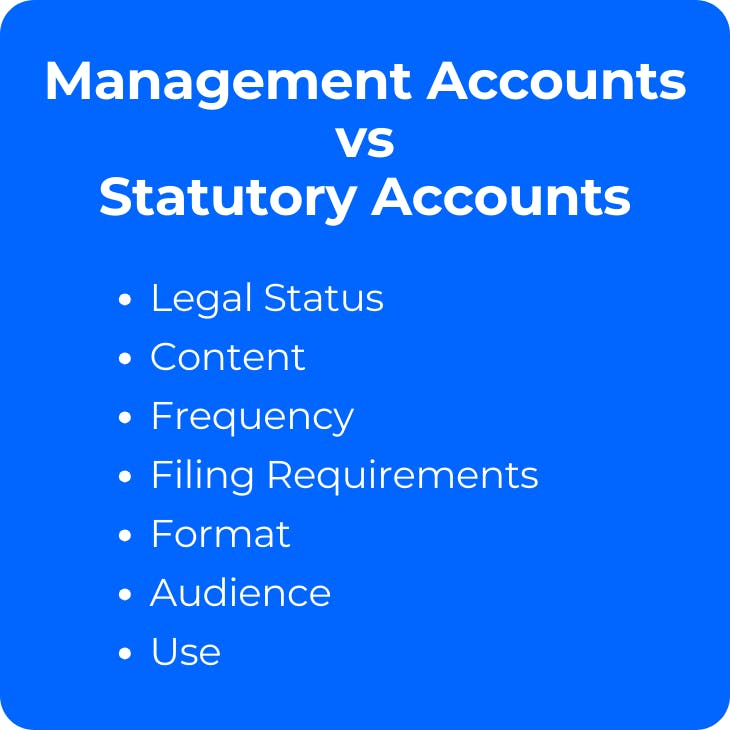Management accounts are internal reports that help monitor performance and guide decisions.
Statutory accounts are legally required and must be prepared in accordance with the Companies Ordinance.
Understanding both is essential for compliance and sound business strategy.
Outsourcing accounting services to professionals like Air Corporate can streamline the process and ensure accuracy.
Understanding the difference between management accounts and statutory accounts is crucial for business owners and decision-makers.
In Hong Kong, all companies must prepare statutory accounts under the Companies Ordinance (Cap. 622), while management accounts are optional but highly valuable for day-to-day business operations.
Both help to monitor the finances of a company and also forecast the performance in the future. That’s why understanding Hong Kong accounting standards is critical to ensure your company complies with the law.
What Are Management Accounts in Hong Kong?
As the name suggests, accounts that aid in the internal decision-making process of a company are known as management accounts. They represent cumulative financial statements prepared during the financial year of a business. Most companies use management accounts for better financial control.
The key objective of management accounts is to track various financial metrics and key performance indicators to gain deeper insights into how a business is faring. However, these accounts are rarely available to shareholders unless the company is struggling.
What Do Management Accounts Typically Include?
Typically, here’s what is included as part of management accounts:
- Balance Sheet
- Profit and Loss Statement
- Cash Flow Statement
- Key Performance Indicators (KPIs)
- Executive Summaries
- Customer and Supplier Analysis
- Project Updates
- Operational Metrics (Production and Delivery)
These reports can be generated using accounting software like Xero, QuickBooks, or Sage, often with real-time dashboards that update automatically.
Are Management Accounts Mandatory in Hong Kong?
No. Management accounts are not legally required under Hong Kong law. However, they can become useful for:
- Startups looking to manage burn rate and plan projections
- SMEs seeking better financial visibility
- Companies preparing for audits or investment rounds
- Businesses looking to qualify for bank loans or grant applications
While statutory accounts are prepared once a year, management accounts help ensure you're not waiting 12 months to catch financial red flags.
Small Businesses & Reporting Exemption (Not the Same as Management Accounts)
Do not confuse management accounts with the reporting exemption framework under Hong Kong law.
Reporting exemption allows certain qualifying companies to submit simplified statutory financial statements, but they still require auditing and do not replace the usefulness of management accounts.
To qualify (per Section 359), a company must meet two out of three of the following:
- Annual revenue ≤ HK$100 million
- Total assets ≤ HK$100 million
- Number of employees ≤ 100
Even with simplified reporting, statutory accounts must be prepared and audited. Well-maintained management accounts can simplify this process.
What Are Statutory Accounts in Hong Kong?
Statutory accounts, also known as audited financial statements or company accounts, are the annual financial statements that all Hong Kong companies (unless dormant) are required to prepare.
They summarize the company’s financial actions and provide a snapshot of earnings, expenses, liabilities, and profits for the financial year.
Purpose of Statutory Accounts
The main goal of statutory accounts is to:
- Demonstrate financial performance to shareholders and regulators
- Fulfill legal duties under the Companies Ordinance (Cap. 622)
- Comply with Hong Kong Financial Reporting Standards (HKFRS) or SME-FRS
- Provide a true and fair view of financial health
What Should Be Included in Hong Kong Statutory Accounts?
The exact scope of information that the statutory accounts would include depends on the size of your company. As per the Hong Kong accounting standards, the statutory accounts of a company should include the following financial reports:
- Balance Sheet
- Profit and Loss Account
- Notes on Accounts
- Audited Financial Statements of the Financial Year (1 April to 31 March)
- Auditor’s Report and Opinion
- Director’s Report
- Cashflow Statement
These documents must be prepared in accordance with HKFRS or SME-FRS (for qualifying entities), signed by a Certified Public Accountant (CPA), and approved by the board of directors. The documents must then be presented to shareholders for adoption.
Compliance & Filing Obligations
All companies in Hong Kong, except those classified as dormant under Section 447, must:
- Prepare financial statements per Sections 380–383 of the Ordinance
- Appoint a Hong Kong CPA for an audit
- Submit audited financial statements with the Profits Tax Return (PTR) to the Inland Revenue Department (IRD)
- For public or guarantee companies, also submit documents with the Annual Return (NAR1) to the Companies Registry
Reporting Exemption & Simplified Accounts
Under the revised Companies Ordinance, certain private companies may qualify for reporting exemption and be allowed to prepare simplified financial statements and directors’ reports.
To qualify as a small private company, your business must meet 2 out of 3 criteria:
- Annual revenue ≤ HK$100 million
- Total assets ≤ HK$100 million
- Number of employees ≤ 100
Alternatively, exemption may be granted with:
- 100% shareholder approval
- A 75% shareholder resolution with no objections
Even if simplified financial statements are allowed, audits are still required unless the company is dormant.

How Do Management Accounts Differ from Statutory Accounts?
| Management Accounts | Statutory Accounts | |
|---|---|---|
| Purpose | Internal planning and monitoring | Legal compliance and transparency |
| Audience | Executives, directors | Shareholders, regulators, tax authorities |
| Legal Requirement | Not required by law | Mandatory under Companies Ordinance |
| Frequency | Monthly, quarterly, ad hoc | Annually |
| Format | Customizable | Standard format under HKFRS or SME-FRS |
| Filing | Not filed with authorities | Filed with IRD and/or Companies Registry |
| Content | Detailed, real-time, KPI-focused | Summary of financial performance |
Benefits of Management Accounts In Hong Kong
- Management accounts provide up-to-date information on cash flow, revenue, and financial position, helping business owners make timely decisions and prevent potential financial crises.
- Regular review of management accounts can help identify suspicious transactions or discrepancies that may signal fraud.
- Chartered accountants often use management accounts to estimate profits and assess provisional tax liabilities, helping businesses plan ahead.
- Management accounts assist in determining distributable profits, which is essential for issuing dividends to shareholders.
- Well-maintained management accounts streamline the audit process by providing auditors with a clear overview of the company’s finances.
- Management accounts detect and correct accounting mistakes before the year-end audit.
- By tracking spending trends, businesses can reduce waste and optimize resource allocation for better profitability.
- There is no statutory format, allowing companies to tailor the reports to suit their internal decision-making needs.
Benefits of Statutory Accounts In Hong Kong
- Statutory accounts provide a comprehensive view of a company’s financial status, based on structured and regulated reporting standards.
- Investors, regulators, and lenders use statutory accounts to evaluate a company’s performance and financial standing.
- Statutory accounts reflect a true and fair view of the business, enhancing trust with external parties and supporting compliance with the Hong Kong Companies Ordinance.
- Serve as a control tool to detect anomalies that may indicate financial misstatements or fraud.
- Reveal how efficiently a business operates, helping identify areas for improvement in internal processes.
Bottom Line
Whether you’re a growing SME or a seasoned business owner, timely and accurate accounting can make or break your long-term success.
Air Corporate offers tailored accounting services to ensure your company’s finances are in order. From preparing statutory accounts to maintaining real-time management reports, our team is here to simplify your compliance burden and help you focus on growth.
FAQs
Yes, if required by the laws of its place of incorporation or by the rules of any foreign stock exchange or regulator, it must file a certified copy with the Companies Registry.
An unqualified opinion confirms compliance with accounting standards and reasonable accuracy. A qualified opinion suggests there are limitations or deviations from accepted practices.
There’s no direct penalty for delay under the Companies Ordinance, but late submission of the audited accounts with the Profits Tax Return may lead to fines by the IRD.



